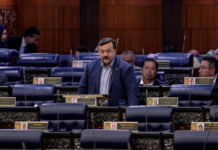KUALA LUMPUR, June 23 — The Malaysian banking industry needs to continue to adapt and change as the pandemic continues to wreak havoc on the economy with the country in its third movement control order, according to Deloitte Malaysia.
Restructuring services leader Khoo Siew Kiat said the COVID-19 pandemic has negatively impacted almost all real sectors with some like the tourism and hospitality, aviation, retail and real estate sectors being worse hit than others.
In a statement today, he said Malaysian banks in general are well capitalised with low non-performing loan (NPL) levels, credit costs and sufficient capital buffers.
“However, NPL ratios are expected to increase once the moratorium or targeted repayment assistance for borrowers come to an end, driven by small and medium enterprises (SMEs) and retail customers.
“The risk of higher loan defaults adds pressure on the profitability of banks. Although Malaysian banks have made additional loan loss provisions to deal with deteriorating loan asset quality, the full extent of the consequences of the pandemic-induced credit risk has yet to emerge,” he noted.
He said previous crises had shown that banks that took bold and difficult decisions early to deal with issues quickly and decisively will recover and thrive ahead of their peer groups.
“Banks looking to navigate the market uncertainty to both survive and thrive in this new normal will do well to plan immediate actions to take to avoid long-term negative consequences of the pandemic,” he said.
These strategies, he said, should not distract banks from conducting or operating its core business but be deployed with tightened operational alignment, together with the help of in-house talent and professional advisors with various skillsets.
Khoo said as the Malaysian market waits for Bank Negara Malaysia (BNM) to re-look into NPL guidelines, banks can prepare for future portfolio sales by conducting data integrity checks, data preparation and remediation, loan portfolio diagnostics, indicative pricing exercises and preparation for the overall transaction process.
He considered a portfolio sale as the most direct way to reduce headline NPL ratios and provide certainty of an early cash receipt as it also frees up capital to be deployed to other more profitable business units that have the scale and technology to thrive post pandemic.
Mature markets such as in Europe have seen portfolio sales as a successful tool to deleverage their balance sheets, with more than US$850 billion portfolio transactions over the last five years.
However in Malaysia, NPL sales have been sporadic over the past couple of years in comparison to our neighbouring countries due to the stringent requirements and approvals required by the central bank before a transaction can be completed, he shared.
Khoo said previous crises have also shown that running a focused non-core asset management unit which is established to specifically undertake high-volume sale and wind down activities have proven successful.
It has become a popular approach globally, allowing existing management to focus on core activities and provide the right skills and resources to develop and execute an appropriate deleveraging strategy for the non-core activities, he said.
“Separating good and bad assets of the bank is key when managing non-core assets,” he noted.
He said banks can consider developing or executing de-risking programmes to reinforce its balance sheet and capital base as surges in non-core and non-productive assets result in larger capital burden.
With IFRS 9 (an International Financial Reporting Standard) in place, higher impairments and rising loan delinquencies may also penalise operating results, he said.
He said analysis of strategic deleveraging options, credit risk management, capital or risk-weighted asset optimisation and portfolio optimisation are a few examples of the strategies that banks can implement.
“At the end of the day, regardless of the strategies employed, banks that take a more proactive approach will remain ahead of its peers and consequently be on the right track to recovery,” he added.
















